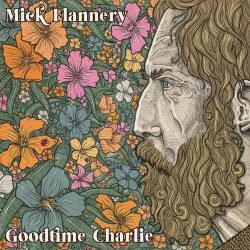Emotionally charged, lyrically rich songs from Irish singer-songwriter Mick Flannery, tackling complex issues people face at various points in the messy arc of their lives.
 When Oh Boy Records, founded by John Prine in 1981, signed Cork, Ireland’s Mick Flannery earlier this year, president Fiona Prine said,“Oh Boy Records continues to be the home label for singer-songwriters who are dedicated to their craft. The body of work created by my husband, John Prine, remains our North Star when making decisions about the artists we bring onto our label. Mick Flannery is arguably one of the best songwriters to emerge from Ireland’s long and storied history of writers, poets and musicians. I couldn’t be more delighted to welcome Mick, as the first international signing, to our Oh Boy Records family. John was proud to be part of the music community on Ireland’s western coast and I know he would be proud of this new partnership with Mick and his team.”
When Oh Boy Records, founded by John Prine in 1981, signed Cork, Ireland’s Mick Flannery earlier this year, president Fiona Prine said,“Oh Boy Records continues to be the home label for singer-songwriters who are dedicated to their craft. The body of work created by my husband, John Prine, remains our North Star when making decisions about the artists we bring onto our label. Mick Flannery is arguably one of the best songwriters to emerge from Ireland’s long and storied history of writers, poets and musicians. I couldn’t be more delighted to welcome Mick, as the first international signing, to our Oh Boy Records family. John was proud to be part of the music community on Ireland’s western coast and I know he would be proud of this new partnership with Mick and his team.”
Flannery’s latest album and his first for Oh Boy, ‘Goodtime Charlie,’ is full of intricate, introspective storytelling, folk and roots rock, and haunting melodies. It includes collaborations with Valerie June, Anais Mitchell, and Tianna Esperanza (granddaughter of The Slits’ Palmolive). With a vocal style much like Ray LaMontagne’s, Flannery narrates the adventures and struggles of a wide range of characters, putting to good use his Balzacian eye for detail. New listeners might be surprised to learn just how young Flannery is if they’ve only heard him sing.
From the painful, anxious self-doubt of youth covered by an aggressive, strident façade (‘Young’) to the devastation of the world and its technology alienating an old gearhead (‘Machine’), the album will land emotionally for whatever stage of life the listener is currently experiencing.
The title track ‘Goodtime Charlie’ is a bluesy, swampy guitar rocker about a hedonistic party boy, easily the biggest earworm of the record. This song and ‘What They Say,’ about a craggy old soul well known on the Reeperbahn, balances out some of the heavier, sad tracks.
‘OK LA’ is not the first song to anthropomorphize Los Angeles as a troublesome woman, but Flannery’s interpretation, co-written with Adam Landry, might well be the best. In this version she is a bleach-blonde toxic narcissist whom he loves anyway. On the slightly uneven ‘Minnesota,’ sung mostly by Anäis Mitchell, that state and America as a whole are cast as a difficult but much-loved child that needs protection.
‘Neon Tonight’ is about a nervous, probably weary band getting ready to go onstage, but could also be interpreted as someone building a home to share while also needing space of one’s own. The search for a haven recurs throughout the album, like on the romantic ‘Morning Rain’ with its delicate piano lines, and ‘Someone To Tell It To.’ ‘Give Me Up’ characterizes a stubborn insistence on loving and staying with someone, however challenging that choice becomes.
The memory of being a young boy helping his father work on cars on ‘Machine,’ just to be around him, turns to the sorrowful realization that the new technology of electric vehicles replacing his father’s beloved V-8 engines is going to pass the aging man by completely. “That’s when you were happy / Elbow on the panel, smiling out the window / Listening to the gravel.”
The mournful ‘The Fact,’ similar to Damien Rice’s storytelling songs, is about the death of a young outlaw, whose body Flannery sees on the road after a fatal car accident on the Alabama-Georgia state line. The added vocals of Valerie June add a harrowing tinge to the story.
Flannery’s gravelly, worldly-wise voice, with an occasional hint of a Southern American drawl, make his keen observations of people very powerful. Thankfully he is also capable of creating a playful, stomping jam with an equally compelling storyline.
Error: Album ID is required.

